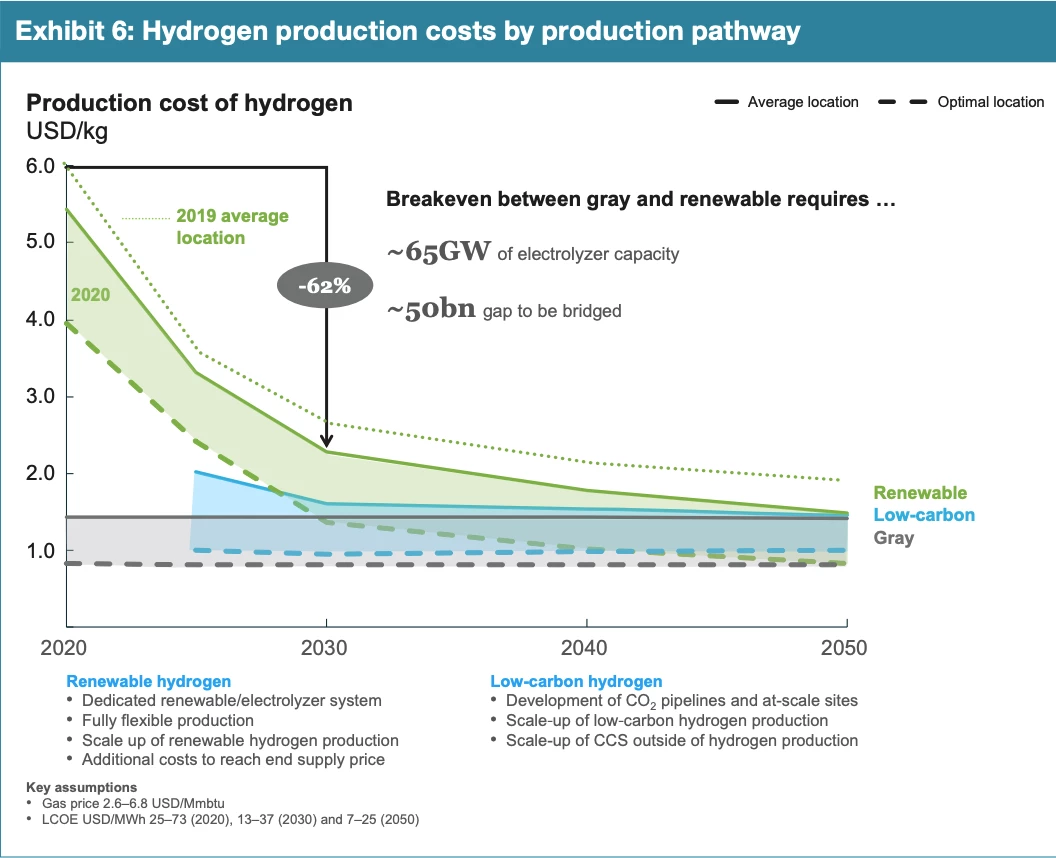A new Hydrogen Council report sheds some light on hydrogen's rise as a green fuel source. More than 30 countries now have a national H2 strategy and budget in place, and there are 228 projects in the pipeline on both the production and usage sides.
Europe is leading the way, with 126 projects announced to date, followed by Asia with 46, Oceania with 24 and North America with 19. In terms of gigawatt-scale H2 production projects, there are 17 projects planned, with the largest in Europe, Australia, the Middle East and Chile.
Overall, projects seem fairly well balanced between hydrogen production and end-use applications, with a smaller number focusing on distribution. European projects are balanced between production and usage initiatives, while Korea and Japan are developing much more on the usage side, for both transport and industrial applications. Australia and the Middle East are more active on the supply side, working to position themselves as hydrogen exporters.
The majority of these projects – some 75 percent, it should be noted – have been announced but do not yet have funding committed. This figure includes budgets committed by governments for spending, for which no project has yet been identified. Only US$45 billion worth of projects are at the "mature" stage, having reached the feasibility study or engineering and design stage, and $38 billion are at the "realized" stage, with a final investment decision made, construction started, or already operational.
Hydrogen production projections for 2030 have leapt up in the last year. The previous report estimated that 2.3 million tons will be produced annually by 2030, and this report revises that figure up to 6.7 million tons. To put that another way, two-thirds of the global hydrogen production expected to be operational in 2030 has been announced in the last year.
Government decarbonization initiatives are a huge driving force behind the hydrogen wave, with some $70 billion committed globally. Carbon pricing is helping, with some 80 percent of global GDP covered by some kind of CO2 pricing mechanism.
Japan and Korea, as you'd expect, are leading the charge on fuel cell vehicles, and globally the report projects some 4.5 million FCVs on the road by 2030, with 10,500 hydrogen fuel stations targeted to meet that demand.

There's good news too in terms of production costs, with prices for green, renewable hydrogen falling faster than expected. Partially, this is because electrolyzer supply chains are ramping up faster than expected, bringing the price of electrolyzers down 30-50 percent lower than anticipated. Other factors include a declining cost of energy, with renewable energy costs revised down by 15 percent, and green hydrogen production companies figuring out their mix of renewable inputs more effectively to keep the hydrolyzers up and running longer.
So while "gray" hydrogen costs are expected to remain stable at around $1.59 per kg, green hydrogen is expected to drop from its current price around $4-$5.50 per kilogram to hit an average of $1.50 by 2050, with green supply potentially becoming cheaper than gray hydrogen in optimal areas as soon as 2030. Low-carbon hydrogen production will start coming online around 2025, with prices sitting roughly between the two. Adding carbon taxes to the gray production could bring green hydrogen to price parity by 2030.
Hydrogen transport is going to become a big deal, with major demand centers likely to look at imports. The cheapest way to do it for short to medium distances is through retrofitted pipelines, provided you've got a guaranteed demand to fill. If demand fluctuates, trucks become more attractive. For longer distances, some routes have undersea pipelines that could be used, but much of the rest will have to be done using ships, which will add around $1-2 to the cost per kilogram.
Long-range overland pipelines also look like an interesting opportunity, with the report pointing out that hydrogen pipelines can transport 10 times more energy than a long-distance electricity transmission line at one eighth the cost. And existing pipelines can be retrofitted to handle hydrogen to vastly reduce the cost of pipeline projects.
The report makes further long-term projections for hydrogen vehicles, trucks, ships and aircraft. In aviation, the report projects hydrogen will become a cost-effective way to de-carbonize short and medium range flights (sub-10,000 km, or 6.200 mi) by around 2040, but there'll need to be significant advances in storage to make it practical for longer range flights.
The report should not be taken as gospel, having been written by the H2 industry itself, but it makes for some interesting reading if you're interested in the development of the clean energy economy.
Source: Hydrogen Council





